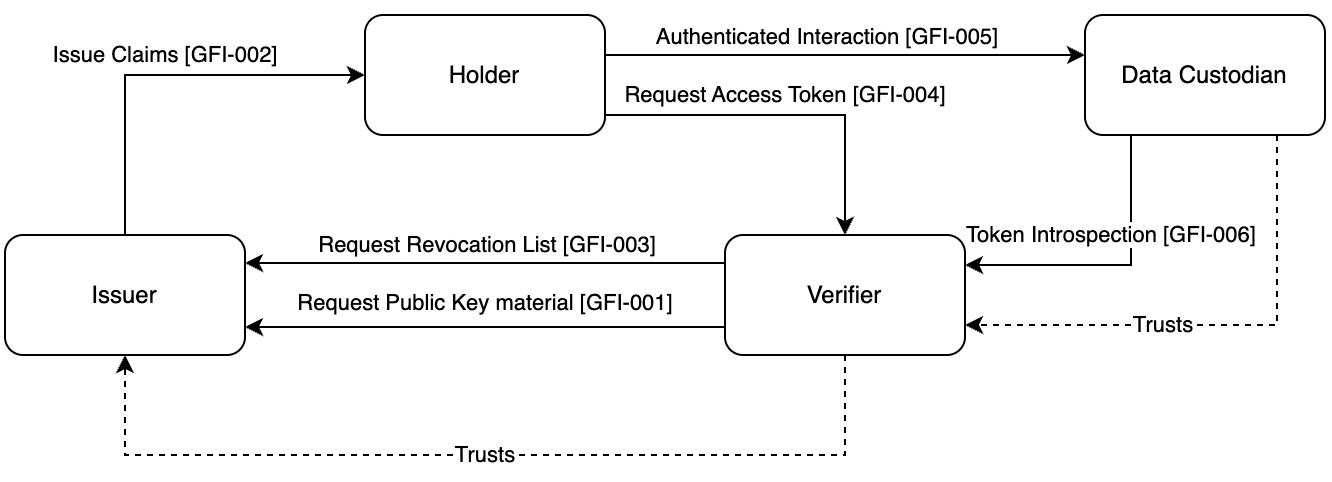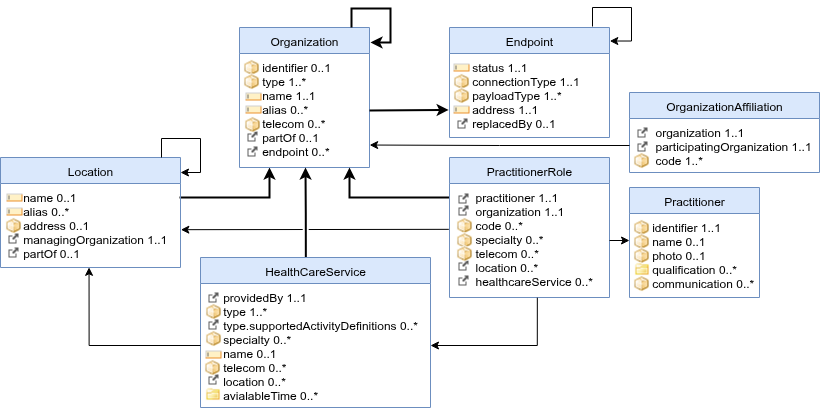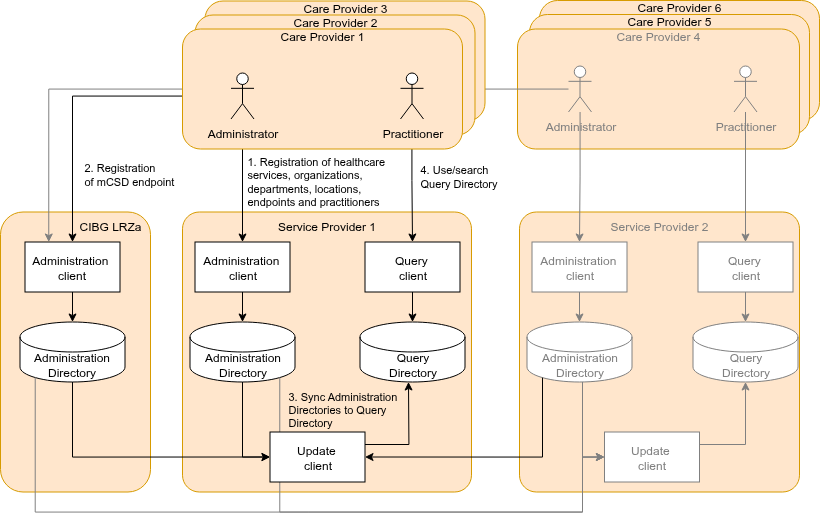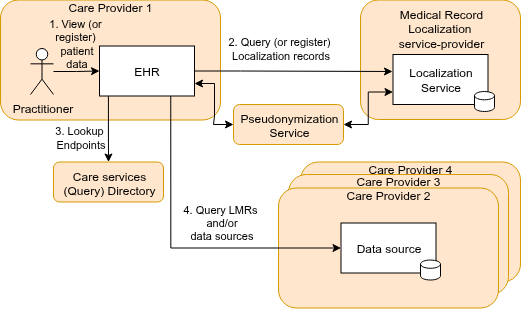




http://fhir.nl/fhir/NamingSystem/uzi-rolcode
http://loinc.org
http://nuts-foundation.github.io/nl-generic-functions-ig/CodeSystem/nl-gf-data-exchange-capabilities
http://nuts-foundation.github.io/nl-generic-functions-ig/CodeSystem/nl-gf-wlz-zorgprofielen-cs
http://www.whocc.no/atc
urn:iso:std:iso:3166
urn:oid:2.16.840.1.113883.2.4.6.7
This fragment is not visible to the reader
This publication includes IP covered under the following statements.
| Type | Reference | Content |
|---|---|---|
| web | tel:+3131599991 | contact : +3131599991 , info@nedap.example.org |
| web | tel:+3131599991 | contact : +3131599991 , info@example.org |
| web | tel:+3131599991 | contact : +3131599991 , info@cp1.example.org |
| web | tel:+31301234567 | telecom : +31301234567 , info@organization3.nl |
| web | tel:+3131599991 | telecom : +3131599991 , info@cp1.example.org |
| web | tel:+31301234567 | telecom : +31301234567 , info@cp2.example.org |
| web | tel:+31612345678 | +31612345678 |
| web | tel:+31301234568 | telecom : +31301234568 , |
| web | tel:+31301234568 | telecom : +31301234568 , john.doe@cp3.example.org , https://matrix.to/#doctorno:cp3.example.org |
| web | matrix.to | telecom : +31301234568 , john.doe@cp3.example.org , https://matrix.to/#doctorno:cp3.example.org |
| web | decor.nictiz.nl |
Specialties handled by the HealthcareService
Binding: SpecialismeCodelijsten ( required ) |
| web | decor.nictiz.nl | Import all the codes that are contained in VerrichtingTypeCodelijsten |
| web | www.nuts.nl |
IG © 2025+ Stichting Nuts
. Package fhir.nl.gf#0.3.0 based on FHIR 4.0.1
. Generated 2026-02-18
Links: Table of Contents | QA Report |
| web | w3c-ccg.github.io | DID Web Method |
| web | w3c-ccg.github.io | A verifier initiates a resolve DID document request using a HTTP GET request to the DID web url. No further parameters are required. The DID web url is constructed following the rules as defined in the DID Web Method . |
| web | openid.net | OpenID4VCI |
| web | decor.nictiz.nl |
The codes SHALL be taken from The codes SHOULD be taken from
SpecialismeCodelijsten
http://hl7.org/fhir/ValueSet/c80-practice-codes|4.0.1
( required to http://decor.nictiz.nl/fhir/ValueSet/2.16.840.1.113883.2.4.3.11.60.121.11.22--20200901000000
)
|
| web | decor.nictiz.nl |
The codes SHALL be taken from SpecialismeCodelijsten
( required to http://decor.nictiz.nl/fhir/ValueSet/2.16.840.1.113883.2.4.3.11.60.121.11.22--20200901000000
)
|
| web | decor.nictiz.nl |
Specialties handled by the HealthcareService Binding: SpecialismeCodelijsten ( required ) |
| web | decor.nictiz.nl | SpecialismeCodelijsten |
| web | nictiz.nl |
The zib HealthcareProvider is mapped to this Location profile and a profile on Organization ( http://nictiz.nl/fhir/StructureDefinition/nl-core-HealthcareProvider-Organization
). This Location profile acts as the focal resource of the HealthcareProvider because most references to this zib are concerned about the recording of the physical location where the care to patient/client takes place rather than the organizational information. For the latter, the profile on Organization is used which is referenced using the managingOrganization
element.
|
| web | zibs.nl | This datatype defines a common basis for expressing all addresses around the world, but adds extensions to express Dutch addresses specifically, according to the zib AddressInformation v1.1 (2020) . A Dutch Address still is a proper FHIR Address, which means that systems that cannot interpret the extensions will still be able to render and work with this datatype. |
| web | nictiz.nl |
The second addition is that the zib defines its own ValueSet for address types, which can only be partially expressed using the FHIR Address datatype and requires a mapping to multiple elements. The table below explains how the zib concepts are mapped to the various FHIR elements (see the ConceptMaps http://nictiz.nl/fhir/ConceptMap/AdresSoortCodelijst-to-AddressUse
and http://nictiz.nl/fhir/ConceptMap/AdresSoortCodelijst-to-AddressType
as well). The code from the zib should also be included using the extension on Address.extension:addressType
.
|
| web | nictiz.nl |
The second addition is that the zib defines its own ValueSet for address types, which can only be partially expressed using the FHIR Address datatype and requires a mapping to multiple elements. The table below explains how the zib concepts are mapped to the various FHIR elements (see the ConceptMaps http://nictiz.nl/fhir/ConceptMap/AdresSoortCodelijst-to-AddressUse
and http://nictiz.nl/fhir/ConceptMap/AdresSoortCodelijst-to-AddressType
as well). The code from the zib should also be included using the extension on Address.extension:addressType
.
|
| web | nictiz.nl | The zib HealthcareProvider is mapped to this Organization profile and a profile on Location ( http://nictiz.nl/fhir/StructureDefinition/nl-core-HealthcareProvider ). The Location profile acts as the focal resource of the HealthcareProvider because most references to this zib are concerned about the recording of the physical location where the care to patient/client takes place rather than the organizational information. Often there's no clear distinction between an organizational structure and a physical location. As a rule of thumb, locations are always used for recording where a service occurs, and hence where encounters and observations take place. |
| web | decor.nictiz.nl |
The codes SHALL be taken from For example codes, see
AfdelingSpecialismeCodelijst
http://hl7.org/fhir/ValueSet/organization-type|4.0.1
( required to http://decor.nictiz.nl/fhir/ValueSet/2.16.840.1.113883.2.4.3.11.60.40.2.17.2.4--20200901000000
)
|
| web | decor.nictiz.nl |
The codes SHALL be taken from For example codes, see
OrganisatieTypeCodelijst
http://hl7.org/fhir/ValueSet/organization-type|4.0.1
( required to http://decor.nictiz.nl/fhir/ValueSet/2.16.840.1.113883.2.4.3.11.60.40.2.17.2.3--20200901000000
)
|
| web | decor.nictiz.nl |
The codes SHALL be taken from AfdelingSpecialismeCodelijst
( required to http://decor.nictiz.nl/fhir/ValueSet/2.16.840.1.113883.2.4.3.11.60.40.2.17.2.4--20200901000000
)
|
| web | decor.nictiz.nl |
The codes SHALL be taken from OrganisatieTypeCodelijst
( required to http://decor.nictiz.nl/fhir/ValueSet/2.16.840.1.113883.2.4.3.11.60.40.2.17.2.3--20200901000000
)
|
| web | zibs.nl |
This .name
element accomodates the official parts of a Dutch name according to common international usage and optionally to the zib NameInformation v1.1 (2020)
. An official Dutch name is represented in FHIR as an ordinary international name, optionally augmented using extensions to specify how the last name is built up according to the Dutch rules if conformance to the zib is required. See the guidance on .family
and on .extension:nameUsage
for more information.
|
| web | decor.nictiz.nl |
DepartmentSpecialty Binding: AfdelingSpecialismeCodelijst ( required ) : Used to categorize the organization. |
| web | decor.nictiz.nl |
OrganizationType Binding: OrganisatieTypeCodelijst ( required ) : Used to categorize the organization. |
| web | decor.nictiz.nl | AfdelingSpecialismeCodelijst |
| web | decor.nictiz.nl | OrganisatieTypeCodelijst |
| web | nictiz.nl | The zib HealthProfessional is mapped for all but one concept (HealthProfessionalRole) to this Practitioner profile and a profile on PractitionerRole ( http://nictiz.nl/fhir/StructureDefinition/nl-core-HealthProfessional-PractitionerRole ). The PractitionerRole resource covers the recording of the location and types of services that HealthProfessionals are able to provide for a HealthcareProvider. The zib concepts Specialty and HealthcareProvider are therefore mapped onto PractitionerRole. |
| web | zibs.nl |
This .name
element represents the Dutch given name ("roepnaam") according to the zib NameInformation v1.1 (2020)
.
|
| web | decor.nictiz.nl |
The codes SHALL be taken from GeslachtCodelijst
( required to http://decor.nictiz.nl/fhir/ValueSet/2.16.840.1.113883.2.4.3.11.60.40.2.17.1.8--20200901000000
)
|
| web | decor.nictiz.nl |
Value of extension Binding: GeslachtCodelijst ( required ) |
| web | decor.nictiz.nl | GeslachtCodelijst |
| web | nictiz.nl | The zib HealthProfessional is mapped for all but one concept (HealthProfessionalRole) to a profile on Practitioner ( http://nictiz.nl/fhir/StructureDefinition/nl-core-HealthProfessional-Practitioner ) and this PractitionerRole profile. The PractitionerRole resource covers the recording of the location and types of services that HealthProfessionals are able to provide for a HealthcareProvider. The zib concepts Specialty and HealthcareProvider are therefore mapped onto PractitionerRole. |
| web | decor.nictiz.nl |
Specialty Binding: SpecialismeCodelijsten ( required ) : Specific specialty associated with the agency. |
| web | decor.nictiz.nl | { " resourceType " : "ValueSet", " id " : "nl-gf-wlz-zorgprofielen-vs", " text " : { " status " : "generated", " div " : "<div xmlns=\"http://www.w3.org/1999/xhtml\"><p class=\"res-header-id\"><b>Generated Narrative: ValueSet nl-gf-wlz-zorgprofielen-vs</b></p><a name=\"nl-gf-wlz-zorgprofielen-vs\"> </a><a name=\"hcnl-gf-wlz-zorgprofielen-vs\"> </a><p>This value set includes codes based on the following rules:</p><ul><li>Import all the codes that are contained in <a href=\"http://decor.nictiz.nl/fhir/4.0/zib2020bbr-\">VerrichtingTypeCodelijsten</a></li><li>Include all codes defined in <a href=\"CodeSystem-nl-gf-wlz-zorgprofielen-cs.html\"><code>http://nuts-foundation.github.io/nl-generic-functions-ig/CodeSystem/nl-gf-wlz-zorgprofielen-cs</code></a><span title=\"Version is not explicitly stated, which means it is fixed to the version provided in this specification\"> version 📦0.3.0</span></li></ul></div>" }, " url " : "http://nuts-foundation.github.io/nl-generic-functions-ig/ValueSet/nl-gf-wlz-zorgprofielen-vs", " version " : "0.3.0", " name " : "NlGfWlzZorgprofielenVS", " title " : "NL GF WLZ Zorgprofielen ValueSet", " status " : "active", " experimental " : true, " date " : "2026-02-18T11:11:30+00:00", " publisher " : "Stichting Nuts", " contact " : [ { " name " : "Stichting Nuts", " telecom " : [ { " system " : "url", " value " : "https://www.nuts.nl" } ] } ], " description " : "The WLZ Zorgprofielen supported by the NL Generic Functions.", " jurisdiction " : [ { " coding " : [ { " system " : "urn:iso:std:iso:3166", " code " : "NL", " display " : "Netherlands" } ] } ], " compose " : { " include " : [ { " valueSet " : [ 🔗 "http://decor.nictiz.nl/fhir/ValueSet/2.16.840.1.113883.2.4.3.11.60.121.11.19--20200901000000" ] }, { " system " : "http://nuts-foundation.github.io/nl-generic-functions-ig/CodeSystem/nl-gf-wlz-zorgprofielen-cs" } ] } } |
| web | www.rfc-editor.org | This guide defines the GF Authentication which is based on the OAuth 2.0 standard. It enables clients to obtain Access Tokens using the extension defined in RFC 7523 . |
| web | www.rfc-editor.org | The involved entities in the transaction are authenticated with a JWT Authorization Grant . The client itself is authenticated through a Client Authentication Assertion . |
| web | www.rfc-editor.org | The involved entities in the transaction are authenticated with a JWT Authorization Grant . The client itself is authenticated through a Client Authentication Assertion . |
| web | w3c-ccg.github.io | The chosen solution for the entity identifier is the Decentralized Identifiers v1.0 standard with the did:web method . This method uses a domain name as the identifier. The domain name is owned by the entity and ownership can be verified by the verifier by resolving the public key hosted at the domain. This method is secured by DNSSEC and HTTPS which guarantees the domainname resolves to the correct webservice and the traffic is not altered. |
| web | openid.net | The protocol to request and issue verifiable credentials is OpenID Connect for Verifiable Credential Issuance (OIDC4VCI) . This protocol is based on OpenID Connect and OAuth 2.0 and defines how to request and issue verifiable credentials between a digital agent and an authoritative registry. |
| web | www.rfc-editor.org | The protocol to request access tokens is based on RFC 7523 , an extension to the OAuth 2.x standard, which defines how to request access tokens using a JWT Authorization Grant combined with a Client Authentication assertion. The JWT Authorization Grant contains a Verifiable Presentation with the required identity claims. The Client Authentication assertion contains the identity of the client according, issued by an authoritative registry. |
| web | www.rfc-editor.org | To prevent token theft, access tokens should be bound to the client by using DPoP (Demonstrating Proof-of-Possession at the Application Layer) . DPoP is a mechanism to bind an access token to a private key, which is used to sign an additional DPoP access token which is uniquely created for each request to the resource server. |
| web | openid.net | OpenID Connect for Verifiable Credential Issuance 1.0 (OpenID4VCI) |
| web | www.rfc-editor.org | RFC 7523 Protocol to request access tokens using a JWT Authorization Grant containing a Verifiable Presentation and a Client Authentication Assertion |
| web | profiles.ihe.net | GFA follows the IHE mCSD profile ( GF-Adressering, ADR-0 ). The mCSD profile provides multiple options for deployment. This guide specifies the choices made for The Netherlands. Most impactful/striking choice are: |
| web | github.com | GFA follows the IHE mCSD profile ( GF-Adressering, ADR-0 ). The mCSD profile provides multiple options for deployment. This guide specifies the choices made for The Netherlands. Most impactful/striking choice are: |
| web | github.com | An 'Update Client' uses the LRZa ( GF-Adressering, ADR-7 ) and the care provider Administration Directories to consolidate all data into a 'Query Directory.' |
| web | github.com |
This overview implies a decentralized architecture for many components. An important central component is the LRZa Administration Directory. For more detail on the topology of GF Adressing, see GF-Adressering, ADR-5
. Each component, data model, and transaction will be discussed in more detail. |
| web | github.com | The Administration Client of the LRZa provides a user interface for healthcare providers to administer their Administration Directory endpoint (URL).( GF-Adressering, ADR-10 and GF-Adressering, ADR#167 ) |
| web | github.com | The Administration Client of the LRZa provides a user interface for healthcare providers to administer their Administration Directory endpoint (URL).( GF-Adressering, ADR-10 and GF-Adressering, ADR#167 ) |
| web | github.com | The performance/availability/data-quality requirements for an Administration Directory ( GF-Adressering, ADR#177 ): |
| web | github.com | Besides using the 'history-type' operation, the Update Client should be able to query all instances in the Administration Directory using a search operation. Either for the initial load or periodically for a full reload to fix edge-case scenario's (e.g. Administration Directory backup restores). ( GF-Adressering, ADR-14 ) |
| web | github.com | During consolidation, multiple Administration Directories may have overlapping or conflicting entities. An Update Client MUST only use data from authoritative data sources ( GF-Adressering, ADR#186 ) and MUST obey these guidelines: |
| web | github.com | Within GF Addressing, profiles are used to validate data. They are based on both mCSD-profiles and nl-core-profiles (TODO: use Nictiz nl-core package as soon as dependency-bug is fixed)( GF-Adressering, ADR#188 ). Ideally, these profiles are merged in the nl-core-profiles in the future. An overview of the most common elements and relations between data models: |
| web | github.com |
An Organization may be reachable for electronic data exchange through electronic Endpoint(s). An Endpoint may be a FHIR server, an DICOM web services, or some other mechanism.
The NL-GF-Endpoints profile
has an extra value set constraint on .payloadType
( GF-Adressering, ADR-8
) and adds constraints from the mCSD-Endpoint profile.
|
| web | github.com | This resource type is out-of-scope for this IG-version (waiting for GF-Adressering, ADR#169 ) |
| web | github.com | The service provider of an Administration Directory must require mTLS. Qualified certificates from Qualified Trusted Service Providers (like PKIoverheid) should be trusted. The service may also have a certificate policy that allows for other types of certificates (e.g. self-signed certificates) provided that -through policy- a sufficient level of trust in these certificates can be established. ( GF-Adressering, ADR#178 ) |
| web | www.vektis.nl | Vektis-AGB is the authoritative source for the care provider type . GF Consent uses the Organization.type element, so it is important to use the authoritative source. |
| web | www.bigregister.nl | BIG-register is the authoritative source for (a part of the) Physicians/Practitioners and their qualifications. |
| web | github.com | The OrganizationAffiliation resource may be added in the future to publish relationships between organizations. ( GF-Adressering, ADR#169 ) |
| web | vzvz.atlassian.net | For explicit consents stored in a national catalogue of patient consent preferences, this specification uses/follows the Mitz afsprakenstelsel , commonly referred to as the OTV ("Online ToestemmingsVoorziening"). The consents stored in Mitz can't be queried directly, but Mitz can process input (data user organization of type X, patient Y and data holder organization of type Z) and return a policy decision (allow/deny) based on the consent preferences stored in Mitz. See the chapters called 'Gesloten Autorisatievraag' in "Implementatiehandleiding_OpenGesloten" for more information. |
| web | vzvz.atlassian.net | For explicit consents stored in a national catalogue of patient consent preferences, this specification uses/follows the Mitz afsprakenstelsel , commonly referred to as the OTV ("Online ToestemmingsVoorziening"). The consents stored in Mitz can't be queried directly, but Mitz can process input (data user organization of type X, patient Y and data holder organization of type Z) and return a policy decision (allow/deny) based on the consent preferences stored in Mitz. See the chapters called 'Gesloten Autorisatievraag' in "Implementatiehandleiding_OpenGesloten" for more information. |
| web | vzvz.atlassian.net | Subscribing to Consent changes: A data holder organization can choose to subscribe to Consent record changes of a specific patient. See the chapters called 'Toestemmingsabonnement' in "Implementatiehandleiding_Migreren-Abonneren-Notificeren-Registreren Toestemming" . |
| web | vzvz.atlassian.net | Receiving notification about Consent: Subscribers (see process 1) receive a notification when Consent changes occur in the Mitz consent preference catalogue. See the chapters called 'Toestemmingsnotificatie' in "Implementatiehandleiding_Migreren-Abonneren-Notificeren-Registreren Toestemming" . |
| web | profiles.ihe.net | This specification reuses the definition of the IHE PCF Consent Recorder . |
| web | vzvz.atlassian.net | This specification reuses the definition of Mitz Consent Registry as described in the Mitz afsprakenstelsel . OTV/Mitz as Consent Registry actor only defines interfaces for subscription and notification of consent changes. See "Implementatiehandleiding_Migreren-Abonneren-Notificeren-Registreren Toestemming" . |
| web | vzvz.atlassian.net | This specification reuses the definition of Mitz Consent Registry as described in the Mitz afsprakenstelsel . OTV/Mitz as Consent Registry actor only defines interfaces for subscription and notification of consent changes. See "Implementatiehandleiding_Migreren-Abonneren-Notificeren-Registreren Toestemming" . |
| web | profiles.ihe.net | This specification reuses the definition of the IHE PCF Consent Registry . A DHTV could implement the IHE PCF Consent Registry capabilitystatement as GF Authorization uses consents in access/authorization policies. |
| web | vzvz.atlassian.net | This specification reuses the definition of the Mitz Authorization Server as described in the Mitz afsprakenstelsel . OTV/Mitz as Consent Authorization Server actor only defines interfaces for the authroization or policy decision also known as "gesloten vraag" . |
| web | vzvz.atlassian.net | This specification reuses the definition of the Mitz Authorization Server as described in the Mitz afsprakenstelsel . OTV/Mitz as Consent Authorization Server actor only defines interfaces for the authroization or policy decision also known as "gesloten vraag" . |
| web | vzvz.atlassian.net | If Mitz/OTV Consents are stored and used locally (at the authorization server or policy decision point of the data holder), the data model SHALL comply to the specification in the Mitz afsprakenstelsel . |
| web | profiles.ihe.net | GF Consent reuses the IHE PCF Explicit Intermediate Consent profile. |
| web | github.com | The IHE PCF Consent profile is evaluated in the Proof of concept phase, but it does not align with the profile in Mitz. Further analysis and (implementer) feedback is needed. This analysis/decision is discussed here |
| web | decor.nictiz.nl | valueset RoleCodeNL for care givers |
| web | www.dezi.nl |
Validation of this credential is non-typical since the issuer does not issue the credential itself but a signed id-token.
The proof.type
of this credential is a custom DeziIDJWT
and contains the JWT as specified in the April 2024 version
of the Vendor Specification.
|
| web | trustoverip.github.io | DID:X509 Method Specification |
| web | nuts-foundation.gitbook.io |
The X509Credential
was originally defined by the Nuts Foundation
as RFC023
.
|
| web | github.com | Open issues and Architectural Decision Records (ADRs) can be found in the GitHub repository |
| web | nuts-foundation.github.io | Implementation Guide |
| web | github.com | Source code |
| web | github.com | Compare this version to v0.2.0 |
| web | github.com | Source code |
| web | github.com | This identifier is applied in the profiles specified in this IG (e.g. NL-GF-Organization or NL-GF-HealthCareService ) and example FHIR-resources (e.g. Organization (department), Condition and Task that references the example Organization/department). For discussion and other solutions that were considered, see GF-Identification, ADR#48 and GF-Identification, ADR#33 . |
| web | github.com | This identifier is applied in the profiles specified in this IG (e.g. NL-GF-Organization or NL-GF-HealthCareService ) and example FHIR-resources (e.g. Organization (department), Condition and Task that references the example Organization/department). For discussion and other solutions that were considered, see GF-Identification, ADR#48 and GF-Identification, ADR#33 . |
| web | nictiz.nl | Patients are identified by BSN as specified in the nl-core-Patient profile . The authentic source for this identifier is Basisregistratie Personen (BRP) that is administered by Rijksdienst voor Identiteitsgegevens (RvIG). The pseudonymization service may be used to transform the BSN to/from a pseudonymized BSN (or from one pseudonymized BSN to another pseudonymized BSN). See namingsystem 'http://fhir.nl/fhir/NamingSystem/pseudo-bsn' for the specification of this identifier. |
| web | nictiz.nl | Practitioners' main identifier is the UZI number (to be renamed in DEZI number) as specified in the nl-core-HealthProfessional-Practitioner profile . The authentic source for this identifier is Dezi-register that is administered by CIBG. |
| web | nictiz.nl | Care providers' main identifier is the URA number as specified in the nl-core-HealthcareProvider-Organization profile . The authentic source for this identifier is URA-register that is administered by CIBG. However, organization departments, locations and healthcare services aren't registered in the LRZa (URA-register). These entities can be identified by the mandatory local data-object identifier . |
| web | decor.nictiz.nl | Care provider organizations are further classified by their role using the Nictiz healthcare provider roles . |
| web | github.com | GF-Localization follows the choices made by the MinvWS Localization working group, see GF-Lokalisatie, ADR's . This guide specifies the choices made. Most impactful/striking choice are: |
| web | github.com | For more detail on the topology of GF-Localization, see GF-Lokalisatie, ADR-2 . Each component, data model, and transaction will be discussed in more detail. |
| web | www.logius.nl | the receiver (of the request or response) exchanges the opaque value for a pseudonym at the Pseudonymization Service. This version of the IG will not go into the details of this Pseudonymization Service and the effect on FHIR transactions. For information on this topic, see the Logius BSNk-pp service . |
| web | github.com | Within GF-Localization the NL-gf-localization-DocumentReference profile is used to register, search, and validate localization records ( NL-GF-IG, ADR#10 ). This data model basically states "Care provider X has data of type Y for Patient Z" . It contains the following elements: |
| web | github.com | No ValueSet has been decided upon yet GF-Lokalisatie, ADR#62 , so in this IG-version, a fixed LOINC code '55188-7' is used: "Patient data Document" |
| web | github.com | Patient identifier BSN (BurgerServiceNummer) is pseudonymized to enhance patient privacy. The pseudonymization service will ensure that patient identities are protected while still allowing organizations to use a joint index.( GF-Lokalisatie, ADR-1 ) |
| web | github.com | The 'HEAD operation and use of existing (FHIR) APIs' is evaluated in the Proof of concept phase. Other solutions are discussed on this page |
| web | profiles.ihe.net | Align with FHIR Workflow, Implementation guide Clinical Order Workflow and IHE mCSD |
| web | informatiestandaarden.nictiz.nl | To support the current eOverdracht specification , (a FHIR STU3 Implementation Guide), 2 extension are added to the eOverdracht Task profile (see the new profile , this example (original example from NictiZ test-resources)): |
| web | github.com | To support the current eOverdracht specification , (a FHIR STU3 Implementation Guide), 2 extension are added to the eOverdracht Task profile (see the new profile , this example (original example from NictiZ test-resources)): |
| web | informatiestandaarden.nictiz.nl | TA Routing specifies the what , who and where of Requests and (coordination) Tasks. These can be applied in workflows like eOverdracht or the workflows defined in the Clinical Order Workflow IG (COW). |
authentication-overview-transactions.png 
|
careservices-datamodel.png 
|
careservices-overview-transactions.png 
|
localization-overview-transactions.png 
|
tree-filter.png 
|